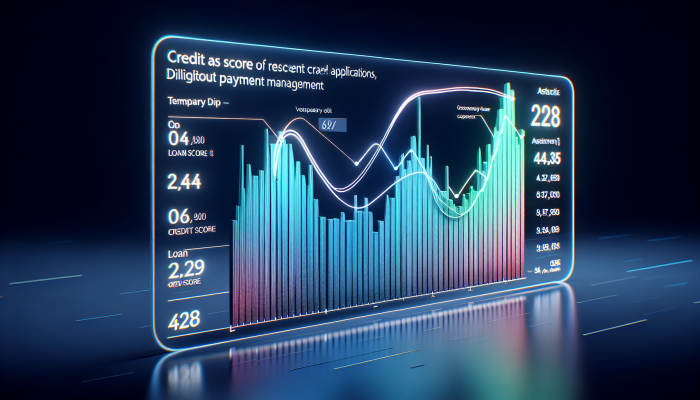Discover How Debt Consolidation Can Transform Your Credit Score: Essential Insights
Engaging in debt consolidation can be a game-changing financial strategy that significantly boosts your overall financial stability. Understanding how debt consolidation influences your credit score is crucial for making informed decisions that lead to a secure financial future. By exploring the intricacies of your credit score and recognizing the impact of consolidation, you can skillfully navigate your financial landscape with confidence and foresight, ultimately working towards your financial goals.
Understanding the Immediate Effects of Debt Consolidation on Your Credit Score

As you embark on your debt consolidation journey, you may observe a temporary drop in your credit score. This initial decline typically stems from hard inquiries that occur when you apply for new credit accounts, such as a personal loan or a balance transfer credit card. Lenders conduct these inquiries to assess your creditworthiness, and each inquiry can result in a brief dip of a few points in your score. It’s important to understand that while this decrease can be unsettling, it is usually a temporary setback rather than a permanent one.
The initial dip in your credit score can be particularly stressful, especially if you are already grappling with financial difficulties. However, you can effectively counteract this decline by managing your consolidated debt responsibly and committing to timely payments. As you consistently meet your obligations on the new loan or credit card, the effects of the hard inquiry will diminish, and your score will gradually recover. This period requires patience and a strong commitment to achieving your financial aspirations.
Harnessing the Long-Term Advantages of Debt Consolidation to Improve Credit Utilization
One of the most significant long-term benefits of debt consolidation lies in its ability to lower your credit utilization ratio. This critical metric evaluates the relationship between your total credit card balances and your overall available credit, which plays a vital role in determining your credit score. A lower credit utilization ratio signals to lenders that you manage credit responsibly, which can greatly enhance your credit profile.
When you consolidate your debt, especially by paying off high-interest credit cards, you can significantly reduce your outstanding balances. This reduction leads to a healthier credit utilization ratio, ideally keeping it below the recommended 30%. By maintaining a low utilization rate, you not only improve your credit score but also position yourself as a lower-risk borrower in the eyes of financial institutions.
However, it is essential to maintain this low utilization level after consolidation. If you start accumulating additional debt on your credit cards following consolidation, you risk negating the positive effects on your credit score. Therefore, a disciplined approach to managing your credit after consolidation is crucial for achieving long-term success.
Understanding the Critical Role of Payment History in Debt Consolidation
Your payment history is the most significant factor affecting your credit score, accounting for approximately 35% of your FICO score. Therefore, utilizing debt consolidation to create a manageable payment plan can greatly enhance your credit profile. By consolidating your debts, you simplify your obligations into a single monthly payment, making it easier to stay organized and on track with your finances.
Consistently making on-time payments after consolidation will contribute to improving your credit score. Each timely payment adds a positive entry to your payment history, helping to offset any initial negative impact from hard inquiries. The longer you maintain a solid payment history, the more significant its influence becomes on your overall credit score.
While this journey may demand discipline and perseverance, the ultimate reward is a healthier credit score and an improved financial standing. Therefore, it is beneficial to view debt consolidation as a strategic tool rather than a temporary fix, as it can yield remarkable long-term benefits.
Examining Various Debt Consolidation Strategies and Their Effects on Credit Scores

Gaining a comprehensive understanding of the various debt consolidation methods is essential, as each approach carries specific implications for your credit score. By exploring these options, you can make informed decisions that align with your financial objectives and personal circumstances.
Using Personal Loans as a Strategic Tool for Debt Consolidation
Personal loans are a popular option for debt consolidation, enabling you to combine multiple high-interest debts into a single loan with a fixed interest rate. This method can yield mixed effects on your credit score. When you apply for a personal loan, it results in a hard inquiry, which may lead to a minor decrease in your score. However, as you begin to make consistent payments, the positive impact on your credit score can be substantial.
Moreover, personal loans generally offer lower interest rates compared to credit cards, allowing you to save money on interest payments while effectively reducing your debt. As you pay down your consolidated debt, your credit utilization ratio improves, leading to further enhancements in your credit score.
However, it is vital to avoid accumulating new debt while you are repaying your loan. This practice helps ensure that you maximize the benefits of debt consolidation while maintaining a healthy credit score.
Exploiting the Benefits of Balance Transfer Credit Cards for Debt Consolidation
Balance transfer credit cards offer an attractive solution for consolidating debt. They allow you to transfer high-interest credit card balances to a new card that provides a lower interest rate, often featuring an introductory 0% APR. This strategy can significantly reduce your interest payments, but it comes with specific credit score considerations.
Applying for a balance transfer card will result in a hard inquiry, which may temporarily affect your credit score. However, if you manage to pay off your transferred balance within the promotional period, you can realize considerable savings. Additionally, this approach can lower your credit utilization ratio, positively impacting your score as long as you keep low balances on your other credit cards.
On the other hand, if you fail to pay off the balance before the promotional period ends, the interest rate may increase significantly, leading to higher payments that could strain your financial situation. Furthermore, maxing out your new balance transfer card could negatively affect your credit utilization ratio, ultimately resulting in a detrimental impact on your score.
Leveraging Home Equity Loans for Debt Consolidation Solutions

home equity loans provide another pathway for debt consolidation, using the equity in your home as collateral to secure a loan. This option can offer lower interest rates, which is advantageous for managing high-interest debts, but it also comes with unique risks and implications for your credit score.
While a home equity loan can assist in lowering your credit utilization ratio and improving your score, the risk of losing your home if you default is considerable. Like other consolidation methods, applying for a home equity loan will result in a hard inquiry, which temporarily reduces your credit score.
It is essential to thoroughly evaluate your overall financial situation before pursuing this option. If you can confidently manage the payments and avoid incurring additional debt, a home equity loan can be a valuable resource for consolidating debt while simultaneously improving your credit score.
Proven Strategies to Mitigate Negative Effects on Your Credit Score
Implement the following strategies to ensure that your debt consolidation experience enhances rather than hinders your credit score. These practices will assist you in navigating the complexities of consolidation while safeguarding your financial health.
Identifying the Most Suitable Debt Consolidation Method for Your Situation
Selecting the most appropriate debt consolidation method is vital for minimizing adverse effects on your credit score. Take the time to thoroughly evaluate various methods, weighing their advantages and disadvantages concerning your specific financial situation.
For example, a personal loan may be a suitable option if you have a steady income and a strong credit profile due to its typically lower interest rates. Conversely, a balance transfer credit card with a lower limit might be more beneficial if your credit is less than stellar.
Conduct comprehensive research on different lenders, scrutinize the fine print, and ensure that you fully understand the terms and conditions associated with each option. This diligence will empower you to choose a method that aligns with your financial goals while minimizing any adverse impact on your credit score.
Maintaining a Low Credit Utilization Ratio After Debt Consolidation
Once you have completed your debt consolidation, it is crucial to maintain a low credit utilization ratio to protect your credit score. One effective strategy is to avoid incurring new debt on your credit cards while you are paying off your consolidated loan. This practice helps keep your credit utilization low and positively influences your credit score.
Additionally, consider utilizing budgeting tools to monitor your spending habits and ensure that you are living within your means. By maintaining low credit card balances and making timely payments, you reinforce a positive credit history, which is something lenders greatly appreciate.
Another practical approach is to request credit limit increases on your existing credit cards. This can enhance your total available credit, thereby lowering your credit utilization ratio, provided that you avoid increasing your spending.
Building a Strong Payment History to Elevate Your Credit Score
A robust payment history is essential for improving your credit score following debt consolidation. Throughout the debt consolidation process, commit to making consistent, on-time payments. This dedication will not only boost your credit score but also instill a sense of financial discipline.
Consider setting up automatic payments for your consolidated loan or credit card to ensure that you never miss a due date. Regularly monitoring your accounts can provide additional peace of mind, enabling you to address any potential issues before they escalate.
Remember, a positive payment history signals to lenders that you are a responsible borrower. Over time, this can lead to increased creditworthiness and the potential for more favorable loan terms.
Real-Life Case Studies: Examining Debt Consolidation and Its Effects on Credit Scores
To fully grasp the effects of debt consolidation on credit scores, let’s delve into real-life scenarios and case studies. These examples will illustrate how individuals have navigated the complexities of consolidation and the resulting impacts on their credit scores.
Case Study: Successfully Overcoming High-Interest Credit Card Debt
Consider Jane, who faced the overwhelming burden of high-interest credit card debt. With multiple cards maxed out and monthly payments spiraling out of control, Jane decided to pursue a personal loan for debt consolidation.
Initially, Jane’s credit score dipped due to the hard inquiry from her loan application. However, as she diligently made timely payments on her new loan, her credit score began to recover. Within a year, her credit utilization ratio decreased significantly, resulting in a notable improvement in her credit score.
Through disciplined financial management, Jane successfully transformed her financial landscape, leveraging debt consolidation to regain control over her credit.
Case Study: Streamlining Student Loan Payments for Better Financial Management
A recent graduate, Mark, faced the challenge of managing multiple student loans with varying interest rates. He opted for student loan consolidation to streamline his payments and potentially lower his interest costs.
Initially, Mark experienced a slight dip in his credit score due to the hard inquiry linked to his consolidation efforts. However, his credit score gradually improved as he made consistent payments on the consolidated loan. Mark maintained a healthy credit utilization ratio by avoiding additional debt, demonstrating the positive impact of consolidation on his credit profile.
This case exemplifies how strategic debt consolidation can yield favorable outcomes for credit scores, especially for young borrowers.
Case Study: Efficiently Managing Multiple Small Debts through Balance Transfer
Sarah had accumulated several small debts from personal loans and credit cards. She selected a balance transfer credit card with an introductory 0% APR to consolidate these obligations.
While her credit score temporarily declined due to the hard inquiry, Sarah successfully paid off her transferred balance before the promotional period ended. Consequently, her credit utilization ratio improved, leading to a steady increase in her credit score.
Sarah’s experience underscores the importance of effectively managing consolidation methods and illustrates the significant potential for improved credit scores through disciplined financial practices.
Debunking Common Myths and Misconceptions About Debt Consolidation and Credit Scores
As with any financial topic, numerous misconceptions surround debt consolidation and its effects on credit scores. Let’s clarify some of the most prevalent myths to gain a clearer understanding of this financial strategy.
Myth: Debt Consolidation Always Results in a Lower Credit Score
A widespread belief is that debt consolidation inherently leads to decreased credit scores. While it is true that hard inquiries can temporarily affect your score, debt consolidation can ultimately foster long-term improvements. By focusing on responsible payment habits and reducing your credit utilization ratio, you can significantly enhance your credit profile.
Understanding this nuance is essential for making informed decisions about your debt management strategies.
Myth: All Debt Consolidation Methods Yield Identical Results
Another common misconception is that every debt consolidation method produces the same effects on your credit score. Different options—personal loans, balance transfers, and home equity loans—carry distinct implications for your credit profile.
Each method has its own advantages and disadvantages, making it crucial to evaluate them based on your unique financial circumstances and objectives. A tailored approach to debt consolidation can maximize its benefits for your credit score.
Myth: Debt Consolidation Erases Your Debt History
Some individuals mistakenly believe that debt consolidation eliminates their debt history, offering a clean slate. In reality, consolidating your debts does not remove your past payment history or existing balances; it simply combines them into a more manageable form.
Your credit report will still reflect your previous debts, and responsible management of the consolidated debt is essential for demonstrating your creditworthiness. Recognizing this fact can help you approach debt consolidation with realistic expectations.
Answering Frequently Asked Questions About Debt Consolidation and Its Effects on Credit Scores
What is the Typical Recovery Time for My Credit Score After Consolidation?
Your credit score generally requires several months to rebound after debt consolidation. The recovery timeline depends on your payment habits and overall credit utilization.
Can Debt Consolidation Enhance My Chances of Securing Better Loan Rates?
Absolutely! Consolidating your debt can improve your credit score, making you a more appealing borrower. This enhancement may enable you to qualify for better loan rates.
What Should I Do If My Credit Score Drops After Consolidation?
If you notice a decline in your credit score following consolidation, focus on making timely payments and maintaining a low credit utilization ratio. Over time, these actions can help rebuild your score.
Is Debt Consolidation Suitable for Everyone?
Debt consolidation may not be the ideal strategy for all individuals. It is crucial to assess your financial situation, including your debts, income, and spending habits, before determining if this approach is right for you.
Can I Consolidate Student Loans and Credit Card Debt at the Same Time?
While both student loans and credit card debts can be consolidated, they generally require different methods. To optimize potential benefits, consider specific options tailored to each type of debt.
Will Debt Consolidation Impact My Ability to Obtain New Credit?
Initially, debt consolidation may affect your ability to secure new credit due to hard inquiries. However, with responsible management of consolidated debt, your creditworthiness can improve over time.
Are There Fees Associated with Debt Consolidation?
Certain debt consolidation methods may involve fees, such as balance transfer or loan origination fees. It’s essential to be aware of these costs before proceeding with consolidation.
How Can I Identify a Reliable Debt Consolidation Service?
Research and compare various debt consolidation services, focusing on reviews and ratings from reputable sources. Ensure that the service is transparent about fees and offers a realistic plan for managing your debts.
Is It Possible to Consolidate Debts Without a Strong Credit Score?
While a strong credit score simplifies the consolidation process, options exist for individuals with poor credit. Consider secured loans or working with credit counselors to develop personalized strategies.
Can Debt Consolidation Serve as a Long-Term Solution?
Debt consolidation can be part of a long-term financial strategy but requires ongoing discipline and responsible financial management. Utilize it as a stepping stone towards a healthier financial future.
Connect with Us on Facebook
This Article Was First Found On: https://www.debtconsolidationloans.co.uk
The Article Debt Consolidation’s Impact on Your Credit Score Was Found On https://limitsofstrategy.com


It’s really insightful to see how debt consolidation can affect credit scores—you’ve done a great job breaking it down. I remember when I went through the process myself; that initial drop in my score was a bit nerve-wracking. It helped me appreciate how those inquiries play into the bigger picture of credit health.
It’s interesting how those initial dips can feel so heavy, especially when we’re focused on improving our credit scores. I went through something similar, and it really opened my eyes to how credit works in the broader financial landscape. In a way, it’s a bit like health; just as our bodies sometimes need to go through a tough reboot to get stronger, our finances can have a similar journey.